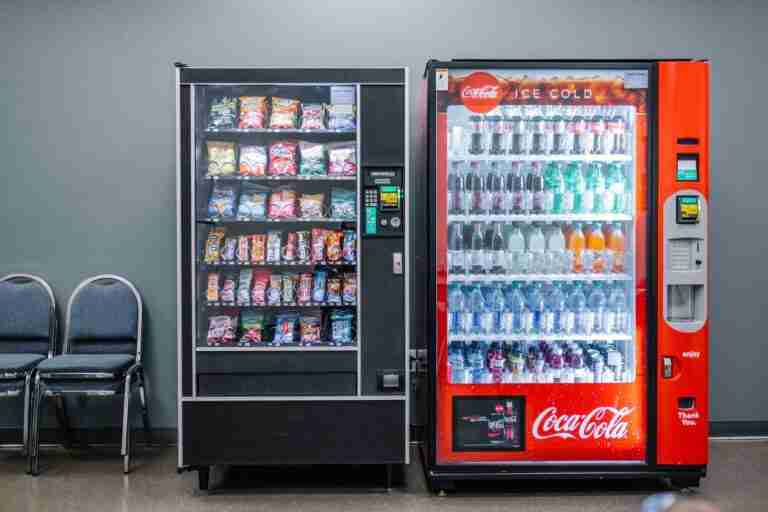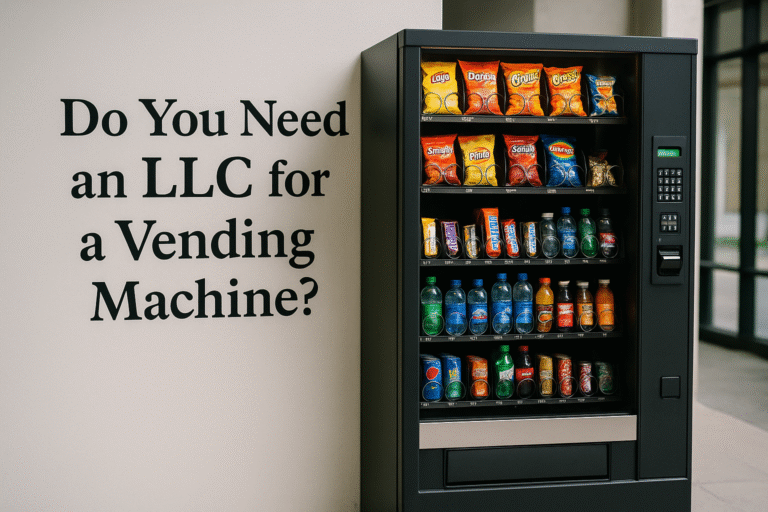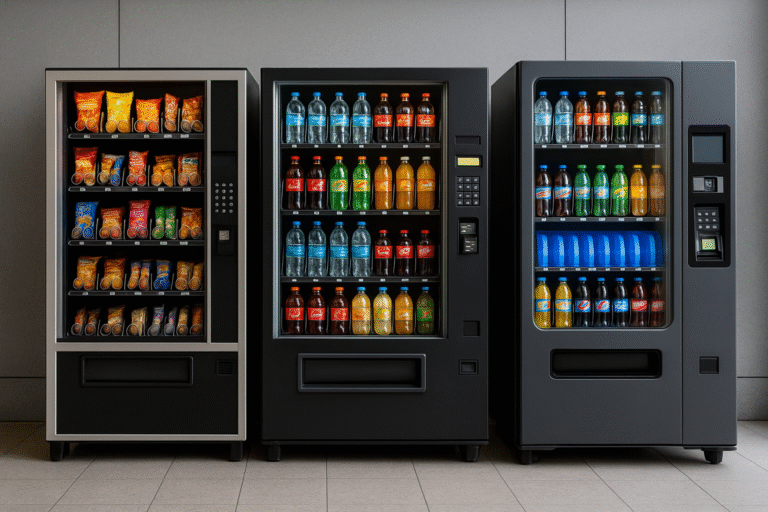¡Envío fijo a Puerto Rico: $1,200 en tu primera máquina y solo $375 por cada adicional! Envíanos un WhatsApp
Navigating the Legal Landscape: Understanding Vending Machine Regulations and Permits
The vending machine business, while lucrative, is governed by a complex web of regulations and permits that ensure public safety, fair competition, and adherence to local laws. As a prospective vending machine operator, understanding this legal landscape is crucial to launching and maintaining a successful vending operation. The journey through the maze of vending machine regulations and permits can be daunting, but with the right information and guidance, you can navigate these waters smoothly and legally.
Understanding Local Zoning Laws
Identifying the Right Location
Zoning laws play a critical role in determining where vending machines can be placed. Before setting up, it’s imperative to understand the zoning restrictions in your intended area of operation. This means reviewing local ordinances and possibly engaging with municipal authorities to identify spots where vending operations are allowed.
Navigating Zoning Restrictions
Some areas may have strict limitations on the type and number of vending machines that can be operated. It’s crucial to delve into the specifics, as non-compliance can lead to hefty fines or the removal of your machines. Taking the time to understand these nuances can save you from future legal and financial troubles.
Vending Machines Regulations: Applying for Zoning Permits
Once a suitable location is identified, the next step is to apply for the necessary zoning permits. This process can vary widely from one municipality to another, so it’s important to gather all the required information and complete all applications accurately to avoid delays in your vending machine business setup.
Securing Health Permits and Safety Compliance
Importance of Health Permits for Edible Products
If your vending machines dispense food or beverages, obtaining a health permit is a non-negotiable requirement. This ensures that your products meet safety standards and protect public health. Regular inspections might be part of the permit’s conditions, so maintaining high hygiene standards is crucial.
Ensuring Your Machines Meet Safety Standards
Vending machines must comply with health and safety regulations to avoid contamination and foodborne illnesses. Machines should be equipped with the necessary features to maintain temperature control, prevent spoilage, and ensure the freshness of the products offered.
Application Process for Health Permits: Complying with Vending Machine Regulations
The health permit application process typically involves a review of your vending machines and possibly an inspection by local health authorities. Prepare detailed information about your machines, products, and maintenance plans to streamline the approval process.
Vending Machine Business Licenses
Determining the Type of Business License Required
Different types of vending businesses may require different licenses. Whether you’re operating bulk vending machines, electronic machines, or specialty machines, make sure to apply for the correct business license that corresponds to your specific operation.
Application and Renewal Procedures
Business licenses come with application procedures that can include background checks, proof of business plans, and payment of fees. They also have renewal terms that must be adhered to for continued operation. Stay informed about renewal dates and any changes in regulations to remain compliant.
Operating Without a License: Risks and Penalties
Operating a vending machine without a proper business license can result in significant legal issues, including fines and the potential for business closure. Understanding the risks associated with non-compliance is a deterrent that underscores the importance of securing and maintaining the appropriate licenses.
Dealing with Vending Machine Licenses Regulations
Navigating Machine-Specific Licenses: A Key Aspect of Vending Machine Regulations
In addition to a business license, each vending machine may require its own license. This is especially true in cities with strict vending regulations. Keep a record of each machine’s location and corresponding license to ensure no machine goes unregistered.
Cost Implications and Budgeting for Licenses
The cost of vending machine licenses can vary depending on location and the number of machines. It’s essential to budget for these costs in your business plan to avoid any financial surprises that could affect your profitability.
License Renewals and Compliance Checks
Regularly renewing your vending machine licenses and staying on top of compliance checks is vital. Keeping a calendar of renewal deadlines and any required inspections can help avoid lapses that could interrupt your business operations.
Vending Machines Regulations: Sales Tax
Understanding Tax Obligations
Most locations require vending machine operators to collect and remit sales tax. Understanding the tax rate in your area and how to apply it to your products is a fundamental part of your legal responsibilities.
Registering for Sales Tax
To collect sales tax, you must register with your state’s revenue department. This process includes obtaining a tax identification number and setting up a system to collect, report, and pay taxes within the designated time frames.
Keeping Accurate Records
Accurate sales records are crucial for proper tax reporting. Invest in vending machines with modern auditing features that track sales and make tax compliance easier. Keeping detailed records not only aids in accurate tax payments but also helps in analyzing your business’s financial health.
Environmental Regulations for Vending Machines
Reducing Environmental Impact
Environmental concerns have led to increased regulations around vending machine energy usage and waste management. Complying with these regulations not only benefits the environment but can also improve the public perception of your business.
Adhering to Energy Efficiency Standards
Some jurisdictions have specific energy efficiency standards for vending machines to reduce electricity consumption. Investing in energy-efficient models can lower operating costs and keep you in line with environmental regulations.
Waste Management and Recycling Policies
Waste from packaging and expired products must be managed responsibly. Understanding and adhering to local recycling policies is important, as is choosing machines that are compatible with environmentally friendly packaging.
Vending Machine Regulations: Accessibility and ADA Compliance
Ensuring Vending Machines are Accessible to All
The Americans with Disabilities Act (ADA) and other similar regulations globally mandate that vending machines be accessible to individuals with disabilities. This means that machines should be placed in locations where they can be easily accessed by everyone.
Adapting Machines for ADA Compliance
Operators must ensure that their machines have features that make them usable by people with various disabilities, such as reachable controls and audible signals for those with visual impairments.
Regular Audits for Compliance
Conducting regular audits to ensure ADA compliance is critical. Failure to comply can lead to legal action and fines, so proactive measures should be taken to ensure all machines meet the necessary standards.
Intellectual Property and Vending Machines
Protecting Your Brand and Products
Trademarking your brand and patenting innovative features of your vending machines protects your business from competitors who might copy your success. It’s a crucial step in safeguarding your assets and ensuring your business’s uniqueness.
Understanding Copyright and Trademark Laws
Navigating the complexities of intellectual property law is essential for vending machine operators, especially when dealing with proprietary products or branding. Legal counsel can provide invaluable assistance in this area.
Dealing with Infringement Issues: Navigating Vending Machine Regulations
If you face intellectual property infringement, it is critical to know how to defend your rights. Monitoring the market for potential violations can prevent others from benefiting from your proprietary ideas and business model.
Compliance with Child Nutrition and Food Allergies
Adhering to Nutritional Guidelines in Schools: A Vending Machine Regulations Perspective
When operating vending machines in schools, compliance with nutritional guidelines is mandatory. These vending machine regulations ensure that the offerings are healthy, contributing to the wellbeing of children and aligning with public health objectives.
Addressing Food Allergy Concerns Within Vending Machine Regulations
With the increasing prevalence of food allergies, it’s vital to label products clearly and take precautions against cross-contamination. This protects consumers and reduces the risk of adverse reactions, which can have serious legal and health implications.
Keeping Up with Changing Nutrition Policies
Nutritional policies are subject to change as new health data emerges. Staying current with these developments and adjusting your product lineup accordingly is key to maintaining compliance and supporting the health of your customers.
Conclusion: Vending Machine Regulations
The Foundation of Regulatory Compliance
Regulatory compliance is not just a legal obligation; it’s the foundation of building a trusted and sustainable vending machine business. Ensuring that every aspect of your operation adheres to local and federal laws is paramount.
Staying Informed and Proactive
Keep abreast of the latest changes in legislation that could affect your vending machine business. Being proactive in your compliance efforts can help avoid costly fines and disruptions to your service.
The Path to Long-term Profitability
Ultimately, a thorough understanding of and compliance with vending machine regulations contribute to a trustworthy brand that customers will return to, ensuring your business’s longevity and profitability.




